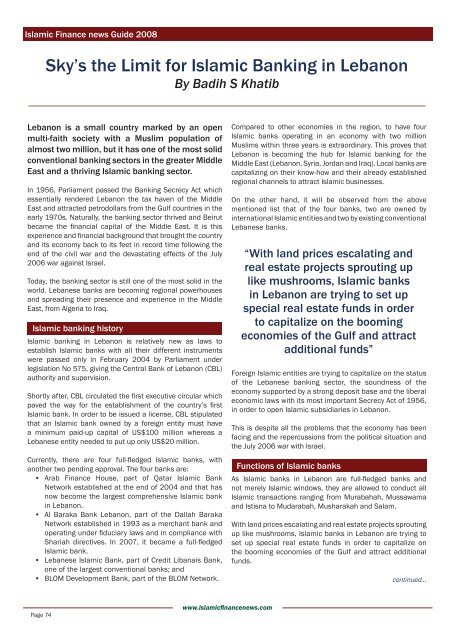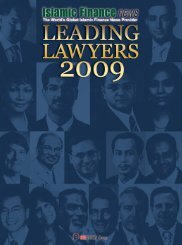You also want an ePaper? Increase the reach of your titles
YUMPU automatically turns print PDFs into web optimized ePapers that Google loves.
<strong>Islamic</strong> <strong>Finance</strong> news Guide 2008<br />
Page 74<br />
Sky’s the Limit for <strong>Islamic</strong> Banking in Lebanon<br />
By Badih S Khatib<br />
Lebanon is a small country marked by an open<br />
multi-faith society with a Muslim population of<br />
almost two million, but it has one of the most solid<br />
conventional banking sectors in the greater Middle<br />
East and a thriving <strong>Islamic</strong> banking sector.<br />
In 1956, Parliament passed the Banking Secrecy Act which<br />
essentially rendered Lebanon the tax haven of the Middle<br />
East and attracted petrodollars from the Gulf countries in the<br />
early 1970s. Naturally, the banking sector thrived and Beirut<br />
became the fi nancial capital of the Middle East. It is this<br />
experience and fi nancial background that brought the country<br />
and its economy back to its feet in record time following the<br />
end of the civil war and the devastating effects of the July<br />
2006 war against Israel.<br />
Today, the banking sector is still one of the most solid in the<br />
world. Lebanese banks are becoming regional powerhouses<br />
and spreading their presence and experience in the Middle<br />
East, from Algeria to Iraq.<br />
<strong>Islamic</strong> banking history<br />
<strong>Islamic</strong> banking in Lebanon is relatively new as laws to<br />
establish <strong>Islamic</strong> banks with all their different instruments<br />
were passed only in February 2004 by Parliament under<br />
legislation No 575, giving the Central Bank of Lebanon (CBL)<br />
authority and supervision.<br />
Shortly after, CBL circulated the fi rst executive circular which<br />
paved the way for the establishment of the country’s fi rst<br />
<strong>Islamic</strong> bank. In order to be issued a license, CBL stipulated<br />
that an <strong>Islamic</strong> bank owned by a foreign entity must have<br />
a minimum paid-up capital of US$100 million whereas a<br />
Lebanese entity needed to put up only US$20 million.<br />
Currently, there are four full-fl edged <strong>Islamic</strong> banks, with<br />
another two pending approval. The four banks are:<br />
• Arab <strong>Finance</strong> House, part of Qatar <strong>Islamic</strong> Bank<br />
Network established at the end of 2004 and that has<br />
now become the largest comprehensive <strong>Islamic</strong> bank<br />
in Lebanon.<br />
• Al Baraka Bank Lebanon, part of the Dallah Baraka<br />
Network established in 1993 as a merchant bank and<br />
operating under fi duciary laws and in compliance with<br />
Shariah directives. In 2007, it became a full-fl edged<br />
<strong>Islamic</strong> bank.<br />
• Lebanese <strong>Islamic</strong> Bank, part of Credit Libanais Bank,<br />
one of the largest conventional banks; and<br />
• BLOM Development Bank, part of the BLOM Network.<br />
www.islamicfi nancenews.com<br />
Compared to other economies in the region, to have four<br />
<strong>Islamic</strong> banks operating in an economy with two million<br />
Muslims within three years is extraordinary. This proves that<br />
Lebanon is becoming the hub for <strong>Islamic</strong> banking for the<br />
Middle East (Lebanon, Syria, Jordan and Iraq). Local banks are<br />
capitalizing on their know-how and their already established<br />
regional channels to attract <strong>Islamic</strong> businesses.<br />
On the other hand, it will be observed from the above<br />
mentioned list that of the four banks, two are owned by<br />
international <strong>Islamic</strong> entities and two by existing conventional<br />
Lebanese banks.<br />
“With land prices escalating and<br />
real estate projects sprouting up<br />
like mushrooms, <strong>Islamic</strong> banks<br />
in Lebanon are trying to set up<br />
special real estate funds in order<br />
to capitalize on the booming<br />
economies of the Gulf and attract<br />
additional funds”<br />
Foreign <strong>Islamic</strong> entities are trying to capitalize on the status<br />
of the Lebanese banking sector, the soundness of the<br />
economy supported by a strong deposit base and the liberal<br />
economic laws with its most important Secrecy Act of 1956,<br />
in order to open <strong>Islamic</strong> subsidiaries in Lebanon.<br />
This is despite all the problems that the economy has been<br />
facing and the repercussions from the political situation and<br />
the July 2006 war with Israel.<br />
Functions of <strong>Islamic</strong> banks<br />
As <strong>Islamic</strong> banks in Lebanon are full-fl edged banks and<br />
not merely <strong>Islamic</strong> windows, they are allowed to conduct all<br />
<strong>Islamic</strong> transactions ranging from Murabahah, Mussawama<br />
and Istisna to Mudarabah, Musharakah and Salam.<br />
With land prices escalating and real estate projects sprouting<br />
up like mushrooms, <strong>Islamic</strong> banks in Lebanon are trying to<br />
set up special real estate funds in order to capitalize on<br />
the booming economies of the Gulf and attract additional<br />
funds.<br />
<strong>continued</strong>...

















